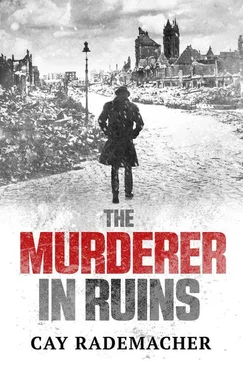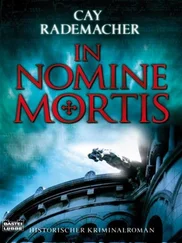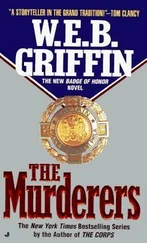Cay Rademacher - The Murderer in Ruins
Здесь есть возможность читать онлайн «Cay Rademacher - The Murderer in Ruins» весь текст электронной книги совершенно бесплатно (целиком полную версию без сокращений). В некоторых случаях можно слушать аудио, скачать через торрент в формате fb2 и присутствует краткое содержание. Год выпуска: 2015, ISBN: 2015, Издательство: Arcadia Books Limited, Жанр: Триллер, на английском языке. Описание произведения, (предисловие) а так же отзывы посетителей доступны на портале библиотеки ЛибКат.
- Название:The Murderer in Ruins
- Автор:
- Издательство:Arcadia Books Limited
- Жанр:
- Год:2015
- ISBN:9781910050750
- Рейтинг книги:5 / 5. Голосов: 1
-
Избранное:Добавить в избранное
- Отзывы:
-
Ваша оценка:
- 100
- 1
- 2
- 3
- 4
- 5
The Murderer in Ruins: краткое содержание, описание и аннотация
Предлагаем к чтению аннотацию, описание, краткое содержание или предисловие (зависит от того, что написал сам автор книги «The Murderer in Ruins»). Если вы не нашли необходимую информацию о книге — напишите в комментариях, мы постараемся отыскать её.
The Murderer in Ruins — читать онлайн бесплатно полную книгу (весь текст) целиком
Ниже представлен текст книги, разбитый по страницам. Система сохранения места последней прочитанной страницы, позволяет с удобством читать онлайн бесплатно книгу «The Murderer in Ruins», без необходимости каждый раз заново искать на чём Вы остановились. Поставьте закладку, и сможете в любой момент перейти на страницу, на которой закончили чтение.
Интервал:
Закладка:
Stave handed his secretary the documents to be typed up, grabbed his hat and coat, muttered a few meaningless phrases and left the room. The minute he closed the door behind him he could hear the conversation resume, as if someone had dropped a record player needle back in the same spinning groove in the vinyl.
It was Saturday evening. Once upon a time he would have been on his way home with Margarethe and the boy after a paddle steamer trip up the Alster or a long walk along the banks of the Elbe. They would have sent Karl off to bed – knowing perfectly well that as soon as his parents had left the room he would have turned the light back on and immersed himself in some crime novel. Then Margarethe and he would have gone out, to a restaurant maybe, or the cinema. And then later…
What a load of sentimental nonsense, Stave told himself. I must be getting old. Or I’ve got maudlin from seeing too many dead bodies of late. He wandered around town at random, through Rotherbaum and Harvestehude, districts that had hardly been scratched, pleasant urban villas, peaceful and calm. There were some streets where you wouldn’t even have believed there had ever been a war – that was, if you ignored the British jeeps parked in the driveways. The driveways of villas that had been commandeered.
Still, the thought suddenly struck him that the rich had it good. Then he told himself there was no point in replacing one daft line of thought with another.
He must have been wandering about like that for half an hour or so before he found himself on Hoheluft Chaussee with his back to the partly demolished elevated railway station, though there had been no trains running for months now.
Stave shivered. The Hoheluft Chausee was a four-lane dual carriageway but the buildings on either side were not particularly striking. Stave picked up speed along the pavement. He had a goal now. The Capitol. It was a cinema he and Margarethe used to go to. It had survived undamaged and had re-opened. There was no electricity for the elevated railway, but there was for the cinema. People had to prioritise.
He almost ran the 300 metres from the stop to the Capitol. There was no neon lighting, just a poster he could hardly make out in the dark. But the cashier’s office was lit up. He bought a ticket and went in without even asking what film was showing. Who cares; all that mattered was that inside he could warm up. And kill time.
First up was The World in Film: the weekly news, pictures from Moscow and London. Stave let them wash over him. A British warship in some port or other, India maybe, Stalin in uniform. Stave was gradually thawing out. Suddenly, right at the end, there were images of children, nameless unidentified refugee children who had been picked up in Hamburg. The authorities put their photos on the screen in the hope of getting in touch with their parents or other relatives. Four different unidentified children every day. What must it be like to nip into some cinema and suddenly find a photo up on the big screen of your own child, a child you’d maybe long ago given up for dead? A chill ran down Stave’s spine. And at the same time he found himself absurdly wishing Karl might appear on the screen.
The main film was 17 Grosse Freiheit, a 1944 musical set on the street of the same name in Hamburg. Starring Hans Albers and Ilse Werner. Just like in the old days. Stave dozed off.
It was late by the time the lights went up again, flickering as ever. Most people were in a hurry to get out. Stave glanced at his watch: it was just before 11 p.m. It would be midnight soon, after which nobody was allowed to leave their home before 4.30 a.m. The English word ‘curfew’ had entered current usage in German.
Purely out of routine Stave fumbled in his jacket pocket to check he had his papers, including the police ID that allowed him to be out on the streets during the hours of curfew. They were all there. They always were. So he had no need to hurry. He slowly put on his overcoat, wrapped his scarf around his neck and pulled his collar up high, then put on his hat, pulling the brim low on his forehead, and finally his tight leather gloves. He had a long walk ahead of him to the other side of the Alster. But he could take his time.
He wondered if the lieutenant had had a pleasant evening. With Erna Berg perhaps? He liked MacDonald. There were people in Hamburg, young lads, some of them fresh out of POW camps, who would mug British soldiers on dark street corners, out of ‘national pride’ as they called it. But they didn’t dare do anything worse.
Stave didn’t hate the occupying army, even though it had been an English bomb that had taken his wife from him. He felt more ashamed of the crimes committed by the Nazi regime and in a perverse sort of way was relieved that both his city and his life lay in ruins. It was just punishment of a sort. And now maybe it was time for a fresh start.
As he strode briskly down the road to keep warm, his thoughts turned from MacDonald to Maschke. He knew no more about him than he did about the British lieutenant. And he found him a lot less likeable. Why though? Stave didn’t like the vice squad man’s attitude: his cynicism, his sarcasm, his sour grapes, his lack of respect for other people. Maybe that was the way you turned out when you had to deal with prostitutes, pimps and madams every day, he thought to himself. And when you still lived at home with your mother.
If things go on like this, the thought suddenly struck Stave, who knows where they’ll transfer me to? Immediately he revisited his instinctive disdain for the vice squad man. He had two murders and not one lead. Everybody was expecting him to deliver results: Ehrlich, Breuer, the mayor even. He was expecting it of himself, goddamnit. I’m no rookie in this business, he told himself.
And there was one other thing nagging at him: what if this was just the beginning of something? If it proved to be a genuine serial killer at work? If again and again they kept finding out there in the ruins the naked bodies of strangled nameless people? If the murders continued until the killer finally made a mistake and they found him? But what if he didn’t make a mistake? Ever? What do I do next, Stave asked himself.
His thoughts turned to Anna von Veckinhausen. What had she been holding back from him? If she was holding anything back at all, that was. Did she have something to do with the murders? Had she seen something? Stave decided to interview her again, and soon. And that had nothing at all to do with the fact that she was pretty and secretive or that it was Saturday evening and he was on his way home from the cinema.
On his own.
All of a sudden he spun round. There was nobody to be seen. Obviously. It was almost midnight. He shivered: it was minus 20°C at least and freezing gusts of wind blew into his face, shredding his skin. A yellow half-moon shone down from a clear starry sky. The street lights were out, the streets themselves gloomy canyons, the mountains of rubble in total darkness, moonlight peeping through the empty windows of bombed-out buildings. Side streets blocked off with temporary barriers because at any moment a bombed-out building could collapse. It was silent. No sound of distant traffic, no human voices, no crackling radio, no late evening birdsong. Nothing. Nix.
Stave stopped for a moment and cocked his ear. Somewhere in the ruins he heard a soft crunch. A sigh. A stone rattling to the ground. The rhythmic creaking of a door to an empty building swinging in the wind, backwards and forwards, backwards and forwards. The quiet patter of rats’ feet as they darted amongst the fallen timber, squeaking to one another.
I’m getting paranoid, Stave thought to himself, but picked up speed, walking down the middle of the road now, as far as possible from the darkness and ruins on either side. He felt in his pocket for his FN22, the cold, oily feel of the metal suddenly reassuring.
Читать дальшеИнтервал:
Закладка:
Похожие книги на «The Murderer in Ruins»
Представляем Вашему вниманию похожие книги на «The Murderer in Ruins» списком для выбора. Мы отобрали схожую по названию и смыслу литературу в надежде предоставить читателям больше вариантов отыскать новые, интересные, ещё непрочитанные произведения.
Обсуждение, отзывы о книге «The Murderer in Ruins» и просто собственные мнения читателей. Оставьте ваши комментарии, напишите, что Вы думаете о произведении, его смысле или главных героях. Укажите что конкретно понравилось, а что нет, и почему Вы так считаете.











